-
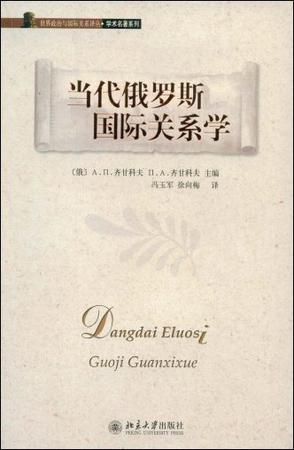
当代俄罗斯国际关系学
《当代俄罗斯国际关系学》俄文版的目的在于审视俄罗斯国际关系学的发展现状,评估其在世界国际关系学中的地位,并展望其未来发展方向。基于在世界国际关系学中形成的对国际关系理论结论的一股性分析,基于当前在俄罗斯最为普遍的国际关系研究方向,主编者设计了《当代俄罗斯国际关系学》的篇章结构并邀请俄罗斯的一些著名国际问题专家就俄罗斯现实主义的特点、国际关系分析中马克思主义方法的现状、安全问题研究、国际谈判、民族冲突等一系列问题发表自己的意见。 《当代俄罗斯国际关系学》中译本向我们全面展示了当代俄罗斯国际关系研究的趋势和问题,对中国国际关系学术研究的发展而言,可以起借鉴与参照作用。 -
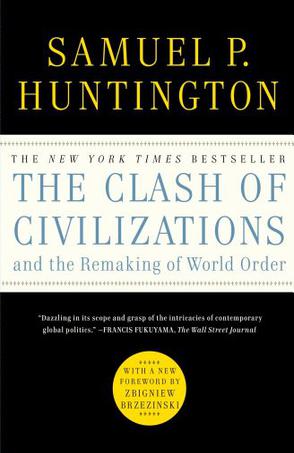
The Clash of Civilizations and the Remaking of World Order
Since its initial publication nearly fifteen years ago The Clash of Civilizations and the Remaking of World Order has become a classic work of international relations and one of the most influential books ever written about foreign affairs. An insightful and powerful analysis of the forces driving global politics, it is as indispensable to our understanding of American foreign policy today as the day it was published. As former National Security Adviser Zbigniew Brzezinski says in his new foreword to the book, it “has earned a place on the shelf of only about a dozen or so truly enduring works that provide the quintessential insights necessary for a broad understanding of world affairs in our time.” Samuel Huntington explains how clashes between civilizations are the greatest threat to world peace but also how an international order based on civilizations is the best safeguard against war. Events since the publication of the book have proved the wisdom of that analysis. The 9/11 attacks and wars in Iraq and Afghanistan have demonstrated the threat of civilizations but have also shown how vital international cross-civilization cooperation is to restoring peace. As ideological distinctions among nations have been replaced by cultural differences, world politics has been reconfigured. Across the globe, new conflicts—and new cooperation—have replaced the old order of the Cold War era. The Clash of Civilizations and the Remaking of World Order explains how the population explosion in Muslim countries and the economic rise of East Asia are changing global politics. These developments challenge Western dominance, promote opposition to supposedly “universal” Western ideals, and intensify intercivilization conflict over such issues as nuclear proliferation, immigration, human rights, and democracy. The Muslim population surge has led to many small wars throughout Eurasia, and the rise of China could lead to a global war of civilizations. Huntington offers a strategy for the West to preserve its unique culture and emphasizes the need for people everywhere to learn to coexist in a complex, multipolar, muliticivilizational world. -
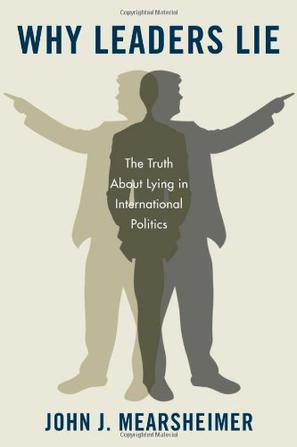
Why Leaders Lie
For more than two decades, John J. Mearsheimer has been regarded as one of the foremost realist thinkers on foreign policy. Clear and incisive as well as a fearlessly honest analyst, his coauthored 2007 New York Times bestseller, The Israel Lobby and U.S. Foreign Policy, aroused a firestorm with its unflinching look at the making of America's Middle East policy. Now he takes a look at another controversial but understudied aspect of international relations: lying. In Why Leaders Lie, Mearsheimer provides the first systematic analysis of lying as a tool of statecraft, identifying the varieties, the reasons, and the potential costs and benefits. Drawing on a wealth of examples, he argues that leaders often lie for good strategic reasons, so a blanket condemnation is unrealistic and unwise. Yet there are other kinds of deception besides lying, including concealment and spinning. Perhaps no distinction is more important than that between lying to another state and lying to one's own people. Mearsheimer was amazed to discover how unusual interstate lying has been; given the atmosphere of distrust among the great powers, he found that outright deceit is difficult to pull off and thus rarely worth the effort. Moreover, it sometimes backfires when it does occur. Khrushchev lied about the size of the Soviet missile force, sparking an American build-up. Eisenhower was caught lying about U-2 spy flights in 1960, which scuttled an upcoming summit with Krushchev. Leaders are more likely to mislead their own publics than other states, sometimes with damaging consequences. Though the reasons may be noble--Franklin Roosevelt, for example, lied to the American people about German U-boats attacking the destroyer USS Greer in 1940, to build a case for war against Hitler-they can easily lead to disaster, as with the Bush administration's falsehoods about Iraq's weapons of mass destruction. There has never been a sharp analysis of international lying. Now a leading expert provides a richly informed and powerfully argued work that will change our understanding of why leaders lie. -
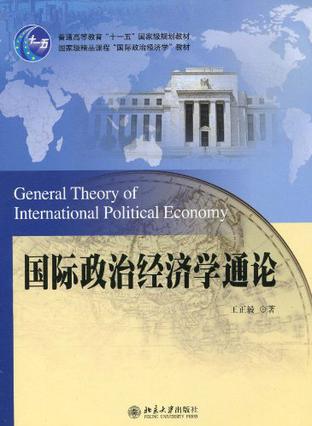
国际政治经济学通论
随着中国不断融入世界体系,中国学术界迫切需要更多的既能反映国际学术界前沿动态,又能体现“中国视角”的国际政治经济学著作和教材。 本书主要有如下四个特点: 第一,构建一个相对完整的知识框架。本书基于定义与研究议题、要素流动与单位层次、规范分析与实证分析以及国际体系与中国经验四种关联性,力图为学生们提供一个相对完整的国际政治经济学知识框架。 第二,追踪国际学术界前沿动态。根据国际政治经济学的研究议题和分析方法,作者将过去40年从事国际政治经济学研究的学者们分为“两代”,系统总结了 20世纪70—80年代“第一代”学者提出的五大理论(相互依存论、霸权稳定论、国家主义理论、依附论和世界体系论),分析了20世纪90年代以来“第二代”学者在核心概念和分析方法上变革的总体趋向。 第三,分析全球政治经济的结构与动力。本书从世界体系与国家兴衰的关系入手,对促使全球政治经济延续 500年的结构和动力进行了总结,并对其在当代的主要表现形式(国际货币、国际贸易、跨国投资、发展与转型以及地区主义)进行了具体的分析。 第四,体现 “中国视角”。国际政治经济学虽然起源于美国和欧洲学术界,但这并不意味着美国和欧洲国家之外的学者只能是知识的消费者。在作者看来,中国学者要成为知识的生产者也许有许多路径,但立足于中国的现实经验,特别是中国过去30年融入世界经济的成功经验进行研究,是成为国际政治经济学领域知识生产者的一个重要途径。 -
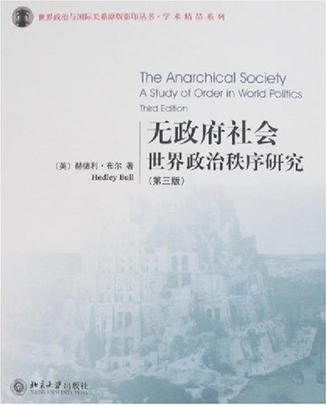
无政府社会
在本书中,布尔探讨了三个主要问题:世界政治秩序的本质是什么?在当代国家体系中,秩序如何得以维持?通往世界秩序的何种替代道路是可行的和适当的?与许多肤浅的观点相反,他认为主权国家体系没有衰落,它并不是世界秩序的障碍,而是其重要的基石。 本书第一部分试图界定秩序,以说明世界政治中并不存在着秩序,探讨了世界政治中秩序与正义的关系。第二部分说明了秩序在当代国家体系中是如何通过均势、国际法、外交、战争和大国的特殊地位等国际社会的制度得以维持的。第三部分分析了世界政治组织的替代形式。 -
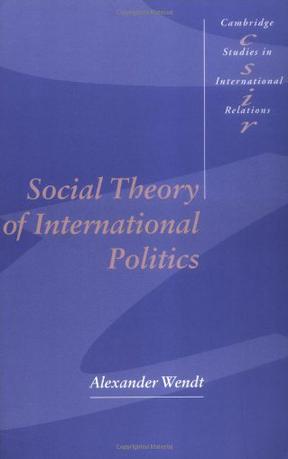
Social Theory of International Politics
Drawing upon philosophy and social theory, Social Theory of International Politics develops a theory of the international system as a social construction. Alexander Wendt clarifies the central claims of the constructivist approach, presenting a structural and idealist worldview which contrasts with the individualism and materialism which underpins much mainstream international relations theory. He builds a cultural theory of international politics, which takes whether states view each other as enemies, rivals or friends as a fundamental determinant. Wendt characterises these roles as 'cultures of anarchy', described as Hobbesian, Lockean and Kantian respectively. These cultures are shared ideas which help shape state interests and capabilities, and generate tendencies in the international system. The book describes four factors which can drive structural change from one culture to another - interdependence, common fate, homogenization, and self-restraint - and examines the effects of capitalism and democracy in the emergence of a Kantian culture in the West.